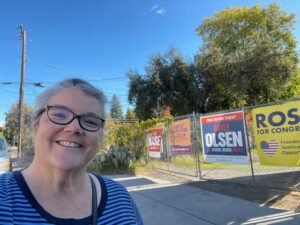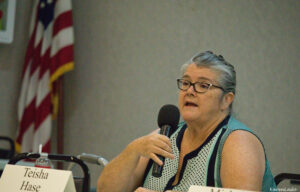by Natalie Hanson
posted Jan. 11
Editor’s note: Gayle Olsen and Teisha Hase joined the Chico Unified School District (CUSD) board this month after winning seats in the Nov. 5 General Election. Read our Q-and-A with Olsen here and our Q-and-A with Hase below. Read our sidebar on policy under the Trump Administration here.
Longtime English and reading educator Teisha Hase is taking her dedication to students to the next level as she assumes her seat on the CUSD board representing Trustee Area 3.

Hase told ChicoSol she’s excited to take on this new journey after 27 years working at Chico and Oroville high schools and tutoring students needing alternative support. Hase, who considers herself a student advocate, has also served as president of the Oroville Secondary Teachers Association (OSTA).
On the campaign trail, she told North State Public Radio about her concern for upholding legal protections for children seeking counseling, including for LBGTQ children, following a lawsuit from a local parent who challenged privacy statues.
Hase won nearly 3,000 more votes than her opponent Michele Cooper as of Nov. 14., according to the Butte County Clerk Recorder’s office. She will represent Area 3 that is comprised of central Chico north of Enloe Medical Center. Hase joined ChicoSol News late last year for an exclusive interview.
Why do you think this experience helped set you apart from your opponents and can inform your goals in this term?
My opponent, in a sort of [posted] concession speech, made the comment that she hopes that under Trump, the Department of Education is dismantled. I find that so disheartening. That 8% [of federal] funding for Chico Unified, if it went away this year, would mean about $16 million lost from the budget.
You don’t lose that and not have it be a hardship for students in programs … Title 1 for disadvantaged students, Title III for English-language learners, [Title] VI for our Native and Islander students, and [Title] IV ensures gender parity. What that’s saying is, these very vulnerable populations are not important to protect. And I vehemently disagree with that.

I taught reading at the high school level, and that was a federally funded class. My entire experience would have been impacted were it not possible to teach students who really needed the extra help. I’ve also had to be very aware [at OSTA] of the contract between the teachers’ association and the district. The school board members, while they’re not really involved in negotiating contracts, should be aware of what the contracts are.
Public schools face a myriad of challenges today — from budget crises and possible closures to fights over equity and how our most vulnerable students are serviced. Which issues are your top priority at this time and how would you bring them to the board for discussion as is appropriate?
I think there needs to be a focus on mental health in our schools. I was a volunteer for the National Alliance on Mental Illness for five years as a facilitator, and I just think there’s so much more we can do to educate educators and our students about mental health. To end stigma, there can’t be shame associated with any mental health issues.
I was also a foster parent for six years, and there’s a stigma associated with foster children, too. It didn’t occur to me that students felt that foster kids were “bad kids” … and so helping these really vulnerable populations are my focuses.
You’ve mentioned your stance on the so-called “parental choice” issue, which was a major focus of some board meetings two years ago. Do you consider this election a referendum on the matter, especially given that a parent’s lawsuit has been rebuffed by a federal judge?
There’s no “parental secrecy policy” at the district. There’s a difference between privacy and secrecy. I’m a parent and grandparent … but that doesn’t mean my rights trump my child’s rights. There are many reasons why a child may not come out to their parent. I have a friend who didn’t come out to his parents until he was in their 40s, and his parents were liberal Democrats. I think you have to trust that people have to come to a peace themselves of who they want to share information with. As a teacher, I’m bound to follow the law, and if the law says I have to have the child’s permission to have a conversation with the parent, then that’s the law.
There’s lots of data that show LGBTQ kids are more likely to become homeless, and if they’re homeless they’re more likely to be victimized and also much more likely to commit suicide. So if my role is to be a child advocate, that is always going to be at the forefront of my position.
We’re facing what a Trump administration might bring and particularly if the Department of Education is dismantled. What do you hope to do with this possibility looming, with the time you have, on the local level? Do you have a personal take on this approach and what it will do to our students and faculty?
It’s difficult to know whether this will be a push because unfortunately you never know whether or not what (Trump is) saying is going to be real. If it happens, who knows what that will look like. What we have to do as a board is really keep our ear to the ground and look at that horizon and see if, if CUSD had to operate with an 8% [federal funding] deficit … then where’s that going to come from? CUSD absolutely has educators whose entire salaries are paid for out of Title I. If that money goes away … it would have to come out of the General Fund. And CUSD probably hasn’t planned on that. I’m hoping the pain will be mitigated, or perhaps the Trump administration will see that this isn’t the means to accomplish what they’re going for. I have to remain hopeful and vigilant.
I hope when pain starts hitting, the community will rise up and say this can’t happen.
What would you want to leave readers with, and ask parents for, as they meet their new board, get more engaged publicly and learn about how they might try to support teachers and school sites?
I think being a supportive parent. I know some students wouldn’t have gotten through my high school English class if it hadn’t been for me and their parents working collectively together. I think also, have it be a given in your mind that schools and staff, not just teachers, want your student to be successful. Nobody’s perfect .. but if you’re an involved parent, you can mitigate anything that could be harmful for your child’s education.
Natalie Hanson is a contributing editor to ChicoSol.
